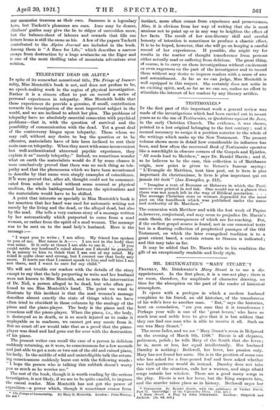TELEPATHY DEAD OR ALIVE.*
IN spite of its somewhat sensational title, The Fringe of Immor- tality, Miss Monteith's book is not, and does not profess to be, an epoch-making work in the region of physical investigation.
Rather it is a sincere effort to put on record a series of personal experiences in telepathy. Miss Monteith holds that these experiences do provide a genuine, if small, contribution towards the investigation of the most important subject in the world, and we are inclined to admit her plea. The problems of telepathy have no absolutely essential connexion with psychical problems—that is, with the question of survival and the possibility of communication with the dead. Yet a great deal
of the controversy hinges upon telepathy. Those whom we may call, without any desire to beg the question or to be
offensive, materialists have of late been inclined to rest their main case on telepathy. When they meet with some inconvenient but well-authenticated abnormal psychic experience, they explain it as " merely telepathy." Indeed, we sometimes wonder what on earth the materialists would do if by some chance it were conclusively proved that there was no such thing as tele- pathy and that the phenomena which we have been accustomed to describe by that name were simply examples of coincidence. If it were proved that, after all, thought could not be communi- cated from mind to mind without some sensual or physical medium, the whole battleground between the spiritualists and the materialists would have to be shifted.
A point that interests us specially in Miss Monteith's book is her assertion that her hand was used for automatic writing not merely by the living and the dead, or the alleged dead, but also by the mad. She tells a very curious story of a message written by her automatically which purported to come from a mad woman, or rather from the spirit of a mad woman. The message was to be sent on to the mad lady's husband. Here is the message :-
" I want you to write ; I am alive. My friend has spoken to you of me. Her name is A—. I am not in the body that was mine. It is only at times I am able to use it. . . . If you could settle my husband's mind about me I should be grateful. It is misery to him to think that I am out of my mind. My mind is quite clear and strong, but I cannot use that body any more. It hurts me that I cannot speak to him and tell him I am not there, and I want to care for my child."
We will not trouble our readers with the details of the story except to say that the lady purporting to write and her husband
were not known to Miss Monteith, and to note the intervention of Dr. Neil, a person alleged to be dead, but who often pro- fessed to use Miss Monteith's hand. The point we want to illustrate by this incident is that the mad woman's message describes almost exactly the state of things which we have often tried to elucidatt in these columns by the analogy of the piano and the piano-player. The body is the piano and the
conscious self the piano-player. When the piano, i.e., the body, is destroyed as in death, or is so much injured as to make it unplayable as in madness, we cannot get any music from it.
But no court of I aw would take that as a proof that the piano- player was dead and had gone out for ever with the destruction of his piano.
The present writer can recall the case of a person in delirium suddenly returning, as it were, to consciousness for a few seconds and just able to get a note or two out of the old and ruined piano, his body. In the middle of wild and unintelligible talk the return- ing consciousness suddenly burst out with the following words : " I hope the person who is talking this rubbish doesn't worry you as much as he worries me."
The rest of the book, though it is worth reading by the serious investigator, is not likely, if we are to be quite candid, to impress the casual reader. Miss Monteith has not got the power of ex-poeition—a power which, though it sometimes comes from • The Fringe of Immortality. By Mary E. Monteith. London : John Murray. net 11 instinct, more often comes from experience and perseverance. Also, it is obvious from her way of writing that she is most anxious not to paint up or in any way to heighten the effect of her facts. The result of her non-literary skill and careful honesty of intention is sometimes to produce a chaotic effect. It is to be hoped, however, that she will go on keeping a careful record of her experiences. If possible, she might try for results in the matter of thought transference from persons either actually mad or suffering from delirium. The great thing, of course, is to carry on these investigations without excitement or even eagerness on the part of the investigator and to record them without any desire to impress readers with a sense of awe and astonishment. As far as we can judge, Mies Monteith is well equipped in this respect. She certainly does not write in an exciting spirit, and, as far as we can see, makes no effort to stimulate the interest of her readers by any literary artifice.


































 Previous page
Previous page